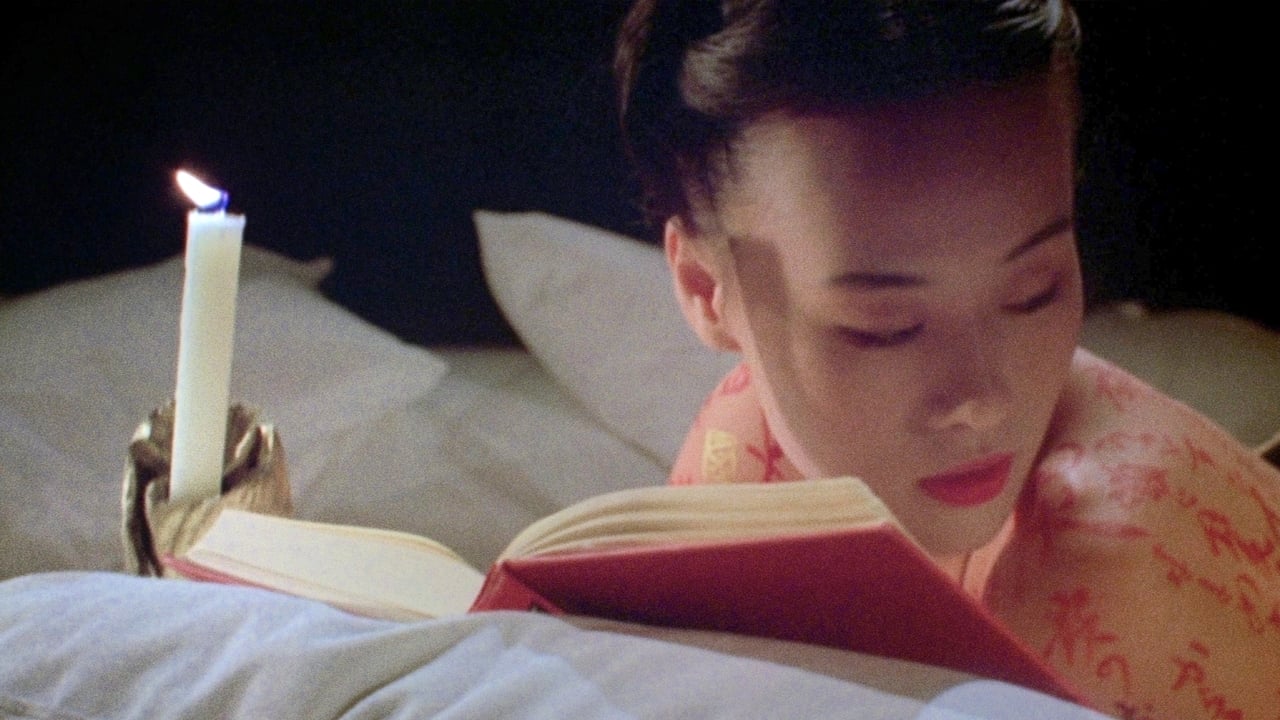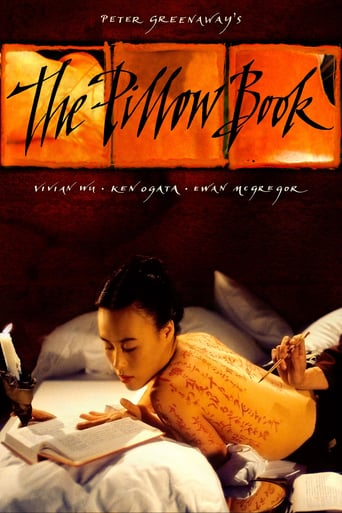

Tied for the best movie I have ever seen
... View MoreOverrated
... View MoreIt’s not bad or unwatchable but despite the amplitude of the spectacle, the end result is underwhelming.
... View MoreIt really made me laugh, but for some moments I was tearing up because I could relate so much.
... View MoreI had heard about this Japanese, Chinese and English film a few times, even before I found out it was once listed in the book 1001 Movies You Must See Before You Die, so I definitely had to watch it, directed by Peter Greenaway (The Draughtsman's Contract, Drowning by Numbers; The Cook, the Thief, His Wife & Her Lover). Basically Nagiko (Vivian Wu) is a beautiful Japanese born fashion model, she formerly lived in Kyoto, her father (Ken Ogata) was a professional calligrapher and struggling writer, as a young woman he painted characters on her face on her birthdays, and her aunt (Hideko Yoshida) often read to her from "The Pillow Book", the diary of a 10th century lady-in-waiting. Nagiko now lives in Hong Kong, she is obsessed with books, papers and writing, her father stopped painting on her when she turned 18, this birthday ritual was indescribably tender and erotic, Nagiko's sexual desire is to have writing painted on her naked body, so she begins making love to calligraphers willing to write on her naked body. Nagiko moves from one to the other searching for the one who will finally satisfy her, but she has no luck, until she meets Jerome (Ewan McGregor), a British translator, who introduces her to the idea of not only writing on her own body, but using his body to write her stories upon his body. When Nagiko finishes, she takes the naked Jerome to her father's publisher (Yoshi Oida), who is aroused by the Englishman, they eventually become lovers. Nagiko meanwhile starts creating her own Pillow Book, Book 1: The Book of The Agenda is started on Jerome, Book 2: The Book of The Innocent and Book 3: The Book of the Idiot is written on two Swedish students, Book 4: The Book of Impotence/Old Age goes on the body of an old man, and Book 5: The Book of the Exhibitionist is delivered by a boorish, fat, hyperactive American (Tom Kane). However Nagiko is devastated when she finds out about Jerome and the publisher, ensuing jealousy turns into tragedy, Jerome is so distraught thinking he has lost Nagiko, and he kills himself. Nagiko is devastated by Jerome's, and has become pregnant with his child, she realises how much she truly loved him, but continues her writing, completing Book 6: The Book of the Lovers on Jerome's dead body. Book 7: The Book of The Seducer is written on a male messenger, Book 8: The Book of Youth is delivered as a series of photographs, a young Buddhist monk bears Book 9: The Book of Secrets, another messenger has Book 10: The Book of Silence written on his tongue, a young wrestler has Book 11: The Book of The Betrayed on his body, another messenger quickly passes with Book 12: The Book of False Starts, and finally Book 13: The Book of the Dead is on the body of a Sumo wrestler. In the end Nagiko is able to let life go on and reminisce her time with Jerome, she has given birth to his child, she is seen writing on her child's face, and quoting from her own Pillow Book, her parfait mélange (perfect blend). Also starring Judy Ongg as The Mother, Ken Mitsuishi as The Husband, Yutaka Honda as Hoki, Barbara Lott as Jerome's Mother and Lynne Langdon Lynne as Jerome's Sister. Wu gives a wonderful performance as the Japanese beauty with a fetish for writing on flesh, and McGregor as one of her many lovers is most memorable, especially as he is not shy getting all his clothes off. What makes the film really interesting is not just the unusual sexual conquest and all the male and female nudity, but the split-screen motifs throughout, it really makes you imagine your flicking through the pages of a book, Greenaway is renowned for making weird films, this stands out as one of the most brilliantly inventive, a great drama. Very good!
... View MoreThe thing about cinema in general, a Western invention and as such shaped by Western thinking, is that it is often too specific, about physical action revealing a moral understanding. The insight is shortsighted. To abstract as all the great filmmakers known to us have done, is to transplant that specific experience into the center from where all creative energy emanates. The Japanese (tracing it back to China) had mastered this centuries ago. It's a culture that revolves around form rather than narrative. Whereas our drama is often hysterical, theirs is subdued and sublimated into abstraction.Their abstraction is in the best possible way about a perfect centeredness. Flowing from and returning to a center. Flowing outwards into form and once replenished there, returning with wisdom about the emptiness of form (and joy that the form is only a mask). Their compositions (painted, written, or later filmed) are clean and sparse, signifying the vitally empty as a dynamic process. Thus every utterance in form, say by the calligrapher's brush, perfectly radiates with that transcendence of opposites - the vital and the empty are one. There is no confusion or agitation that comes from attachment, that's the idea at least.The thing about Greenaway is that he's aiming for a similar transcendence, but through an effort of loading forms until they break to reveal. When he fills his films with lists and lists about books, our constricted knowledge of the world and how it limits, it is always with the intent of transcending them. It is always about the creative process as a means of reaching beyond the list. Prospero's Books reaches there, arguably however the work was already laid out for him by Shakespeare.Here he tackles a subject that is completely alien to Greenaway logic. It is about a young Japanese woman doggedly looking to find a man who is both a lover and a calligrapher. Who can write beautifully on her naked body. The film specific idea chimes with the heart of the abstraction; inner expression expressed in visible form, with in our case the naked body as a perfect blank paper. And that expression in form brought by its author literally to life.There is not much to say on the subject outside the depiction. The very act communicates all. So that leaves the rest of the film a series of beautiful tableaux about bodies, naked or not, painted or not, and calligraphic backdrops of various kinds. Eventually it is again about books, human books each with its own message, where thought is exorcised so that it can be replenished again. Having emptied herself of all the accumulations of her past, by the end she is free to write her own 'pillow book'. She can sign her own name. As usually with Greenaway, everything is also about him creating his own film.Maybe because he's done this kind of thing for so long that it has lost its novelty, maybe because his style to overload is in stark contrast with the vital emptiness the subject demands, the film seems to be missing something. Prospero's Books was closer to his sensibility and as such a more rewarding film (if also more oblique and difficult).
... View MoreThis film is about a Japanese woman who has an obsession with calligraphy on skin.The plot is absolutely bizarre. I fail to see any "sensual" or "erotic" undertones. The plot turns an ancient art form into a fetishistic pornography. In addition, the scenes that are filmed in Hong Kong are certainly portraying bad parts of Hong Kong, such as the airport in the middle of the city, poor living conditions and noise pollution. Throughout the whole film, I keep thinking that "The Pillow Book" is insulting the Japanese culture and the Hong Kong environment."The Pillow Book" is a perverted, yet boring film. Seriously stay away from it.
... View MoreDefinitely check this one out....a little slow and ponderous at times, but the visuals more than make up for it. Beautiful visuals reminded me a lot of artist Ann Hamilton and some of her installation pieces. There is also some really innovative cinematography like the use of screens within screens displaying different moments of the same scene in time or in different historical periods. The historical scenes are also lushly photographed and amazing costumes as well. If anything else, Ewan McGregor is full frontal naked for a majority of the second half....that alone makes it worth seeing this movie. WOO HOO! Talk about being well endowed!
... View More